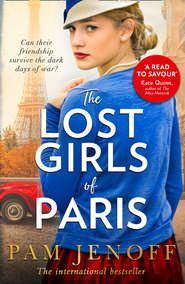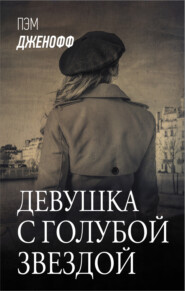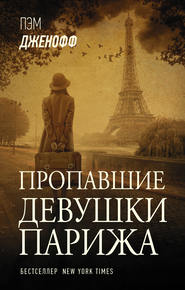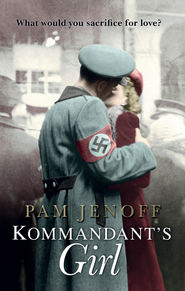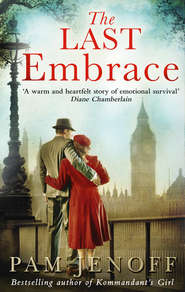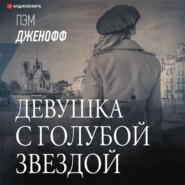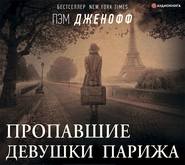По всем вопросам обращайтесь на: info@litportal.ru
(©) 2003-2025.
✖
The Winter Guest
Автор
Год написания книги
2018
Настройки чтения
Размер шрифта
Высота строк
Поля
Last spring, Helena had cut down a block of wood and affixed it to Dorie’s right shoe to compensate. It worked, and the limp had been all but gone when she had worn it. But a day later, Dorie had pulled the wood from her shoe. “It just doesn’t feel right.” Around the house, her limp had become so much a part of things they scarcely noticed it. As Helena watched Dorie hobble now along Michal’s long, foal-like gait, she seemed so vulnerable.
Michal and Dorie bounded through the door, spurred by the brisk morning air, their two heads bobbing auburn. Helena opened the shutters to let in the light. Ruth kept the children immaculate, Helena conceded inwardly. Their clothes were not torn or stained, the darned bits hidden so well they could scarcely be seen. She brushed their teeth with baking soda each night, insisted that their baths be thorough. Helena sometimes wondered why she bothered when they so seldom saw anyone but one another.
Outside the children ran in circles, Michal pretending to exert himself but really going much slower than he might have, allowing Dorie to catch him and feel that she was doing well. They chased a chipmunk around the yard, nearly colliding into the dwindling woodpile as the animal ducked beneath. Watching them play together, Helena was flooded with pride—despite their thinness and simple clothing, there was a light about them, a kind of strength other children did not possess. And they had a way of instinctively protecting each other, always had, even before they could walk or speak.
Was it different for them somehow because they weren’t twins? Helena wondered. With her and Ruth, it had always been a competition, who had spoken first (Ruth) and walked first (Helena), and later who was prettier, smarter, could sew or cook better. But it wasn’t any easier having older or younger siblings, she supposed, someone always ahead of you in the queue or behind in the scramble for food or attention. It was the plight of being one of many. Big families were the norm in these parts, even families like their own that could ill-afford them.
As the children disappeared into the barn, she smiled at Michal’s awkwardness, the way he had not quite grown into the long legs and broad shoulders he’d inherited from their father. “I heard something at market the other day,” Ruth said in a hushed tone, even though only little Karolina was there to hear them. Helena’s breath caught. Had Ruth learned—or somehow guessed—about the soldier? Guilt nagged at her suddenly. Until now, she always told Ruth everything. Yet this time something had held her back. It was as if, by discovering the man in the woods, she had taken a step apart from her siblings.
Helena licked her lips. “What is it?”
“The Garzels disappeared—Pani Kowalska said maybe they were arrested.”
Helena’s brow arched. “She said that?”
Ruth bristled. “Well, she didn’t exactly say it, but she suggested that was the case.”
Helena waved her hand dismissively. “Just silly gossip from an old woman with too much time on her hands.”
Ruth tried again. “She said that they arrested the Jews in Nowy S˛acz, too. People couldn’t make up such awful things from whole cloth, could they? There must be some truth to it.” She sounded as if she really needed Helena to believe her.
“Perhaps,” Helena said, trying to take the idea seriously. She started to lift Karolina down from the chair before she began to fuss, demanding to climb down herself.
“Here,” Helena said, relenting and letting her do it, but keeping a protective hand close behind. Karolina looked at her in disbelief—it was Ruth, not Helena, who usually gave in. But the child’s smile, so rare these days, was reward enough. Karolina scampered down. She had always shown physical prowess beyond the others, rolling over at three months and walking at nine months, almost as if she knew that the world was testing her, and despite her small size she would need to get around on her own two feet. Helena checked her forehead and noted with relief that her skin was now cool to the touch, then released her to play on the floor.
“People wouldn’t stand for it,” she replied to Ruth, resuming their conversation in that fractured way that happened frequently while they were caring for the children. A lack of confidence eroded her voice. In fact, the war had stripped away so many civilities, given people a license to act on their deeper, baser selves. Many, she suspected with an uneasy feeling, would be only too happy to let the Germans get rid of not just Jews but neighbors they had never really wanted in the first place.
Helena’s eyes traveled to the corner by the fireplace, where the scarf Ruth had knitted for Piotr still lay crumpled in a ball, untouched though months had passed. She kicked it out of the way, hoping Ruth had not seen. Anger rose within her as she thought of the boy who had broken her sister’s heart. “He’s not worth it,” she had wanted to say many times since Piotr last had come. But she held back, knowing such sentiments would only bring Ruth more pain.
Helena gestured to Karolina’s thick hair, which Ruth had cowed earlier into two luminous pigtails. Karolina was the outlier in their auburn-haired cluster—thick locks the color of cornstalks made her shine like the sun. “Do mine next?” she asked.
“Really?” Ruth’s brow lifted. Helena held her breath, wondering if she’d gone too far. She’d never had the patience to sit, instead pulling her hair into a scraggly knot at the back of her neck. She worried that this, coupled with her announcement of an extra visit to their mother, might arouse Ruth’s suspicion. But Ruth just shrugged. “Sit down.” Helena dropped into the chair. Ruth’s touch was gentle, her movements soothing as she coaxed the stubborn wisps into place with deft fingers. Helena fought the urge to fidget—it was all she could do not to leap from the chair and run out the door into the forest.
“Mischa needs shoes,” she announced grimly when Ruth had finished braiding. Ruth’s brow wrinkled. For the girls, there was always an old pair to be handed down, but Michal would not be big enough to wear Tata’s boots for at least another year or two, and there was no money for new ones. “What about your knitting? You could sell some pieces.”
Ruth cocked her head, as if she had not considered that her handiwork would have value to anyone outside of the house. “Perhaps with Christmas coming I can barter something knitted for a pair at market.”
Christmas. The word sounded foreign, as if from another lifetime. “Remember how Mama would decorate the house with mistletoe?”
“Holly,” her sister corrected, her voice crackling with authority. With Ruth, there was always a rejoinder. “And we would sing carols until she would give us a coin to stop.” Helena smiled fondly at the memory, one of many that only she and Ruth shared. “Then we would open our gifts and Tata would pretend to fall asleep early...”
“He didn’t...” Helena began. Tata hadn’t pretended to sleep; he had passed out from the half bottle of homemade potato vodka he consumed during Wigilia, their Christmas Eve feast. Even as a young child, Helena had known the truth. How could two people live the same moment but remember it so differently?
“Of course he did,” she relented, allowing Ruth to win. Ruth sniffed with quiet satisfaction.
Helena brushed aside the memories, forcing herself to focus on more practical matters. “Or we could sell it,” she said, gesturing with her head toward the corner. The sewing machine, which Tata had bought for their mother as a wedding present, had been her most prized possession. It would fetch a fair price, even from someone who wanted to use the parts for scrap.
“No!”
“Ruti, we must be practical. We need food and coal.”
But Ruth shook her head. “We need it. That’s why Mama left it to me. She knew you wouldn’t keep it safe.”
A lump of anger formed in Helena’s throat. Had Mama actually bequeathed the sewing machine to Ruth while she was still coherent enough? More likely, Ruth had simply presumed. Helena swallowed, struggling not to retort. Ruth clung to the machine because letting it go meant acknowledging that things had changed permanently, and that Mama was not coming back.
Helena walked back to the fireplace where Karolina played by the hearth. “Let’s get you dressed.” She held out her arms, but the child hung back, looking up uncertainly at Ruth. It was Ruth from whom the children sought care and affection, preferring her softer voice and gentle, uncalloused hands.
Ruth crossed the room gracefully, appearing to swirl rather then walk, her skirt a gentle halo around her—not like Helena, who seemed to crash headlong at full force. She scooped Karolina up with effort. “She’s getting too old to be carried all of the time,” Helena scolded. “You’ll spoil her.” Ruth did not reply, but smiled sweetly, smoothing her hair and kissing the top of her head. Dorie and Karolina had had so much less of their parents than the others. Ruth tried to make up for it, fashioning little treats when she could and singing to them and rocking them at night. Karolina eyed Helena reproachfully now as Ruth carried her past. Helena opened her mouth, searching for the right words. She loved the children, too, though perhaps she never told them as much. But they needed to be strong in these times.
Helena walked past her sisters to the bedroom. Fingering the stain on her sleeve, Helena’s eyes roamed longingly toward the armoire. She opened the door. Mama’s clothing still hung neatly, as clean and pressed as the day she had gone to the hospital. Her church dress was practically new, the gleaming buttons kept immaculately. Even her two everyday dresses were nicer that Helena’s, having been spared the hardships of the woods these many months.
Helena reached inside and pulled one of the dresses out. She remembered Christmas two years earlier, when Ruth had opened a box to reveal a new skirt, pink and crisp. “There was only money for one,” Mama explained. “And Ruth’s bigger. You’ll have her old one.” It had been a pretext. Though Ruth was a bit fuller figured, the truth was that she was the prettier one with the better chance of marriage, and it was always presumed that she should have the nicer, more feminine things. There had never been any talk of a suitor for Helena, even in happier times.
“What are you doing?” Helena jumped and spun around. Ruth had appeared behind her, stealthily as a cat.
Helena held up the dress. “I was thinking of borrowing this.”
“Nonsense,” Ruth snapped. “Yours is good enough for traipsing through the woods and doing chores. You’d only soil it and we need to leave it for when Mama comes home.” She eyed Helena warily, daring her to argue. Then Ruth took the dress from her and returned it to the armoire, closing the door firmly behind her.
5 (#ulink_983a52fe-62d8-5376-a2e0-7be374b7c918)
The sun was dropping low to the trees later that afternoon as Helena neared the chapel and pushed open the door. “Dzie´n dobry...?” she called into the dank semidarkness. Silence greeted her. Surely the soldier could not have fled in his condition. For a second, she wondered if she’d imagined him. He could be dead, she thought with more dismay than she should have felt for someone she’d only met once. His wounds had seemed serious enough.
She pulled back the shutter that covered one of the broken windows to allow the pale light to filter in. The soldier was curled up in a tight ball on the ground, much as he had been when she found him, but farther from the door. She hesitated as excitement and alarm rose in her. What was she thinking by coming here? She didn’t know this man, or whether he was here to help or do harm.
Helena walked over and knelt to feel his cheek, caught off guard by the softness of his skin. She was relieved to find he was still warm. Then she remembered Karolina’s illness, barely passed. Had she made a mistake by coming and possibly bringing sickness to this man in his already-weakened state?
The soldier moved suddenly beneath her hand and she jumped. His eyes snapped open. He stiffened, almost as Mama had when she feared pain in the hospital.
“It’s okay,” Helena said, holding her hands low and open. “I’m the one who brought you here.”
He forced himself to a sitting position, trying without success to stifle a whimper. “Who are you?” His Polish was stiff and a bit accented.
“I’m called Helena. I live close to the village. You should rest,” she added.
But he sat even straighter, clenching and unclenching his hands. His chocolate eyes, set just a shade too close together, darted back and forth. “Does anyone else know that I’m here?”
“Not that I’m aware,” she replied quickly. “I haven’t told anyone.” She wanted to say that someone else might have heard the crash, but it seemed unwise to upset him more.
He stared at her, disbelieving. “Are you sure?”
“I haven’t told anyone,” she repeated, suddenly annoyed. “Why would I have gone to all of the trouble to save you just to turn you in?”
He shrugged, somewhat calmer now. “A reward, maybe. Who knows why people do anything these days?”
“No one knows that you’re here,” she replied, her voice soothing.
“Where is ‘here’ exactly?” he asked.






